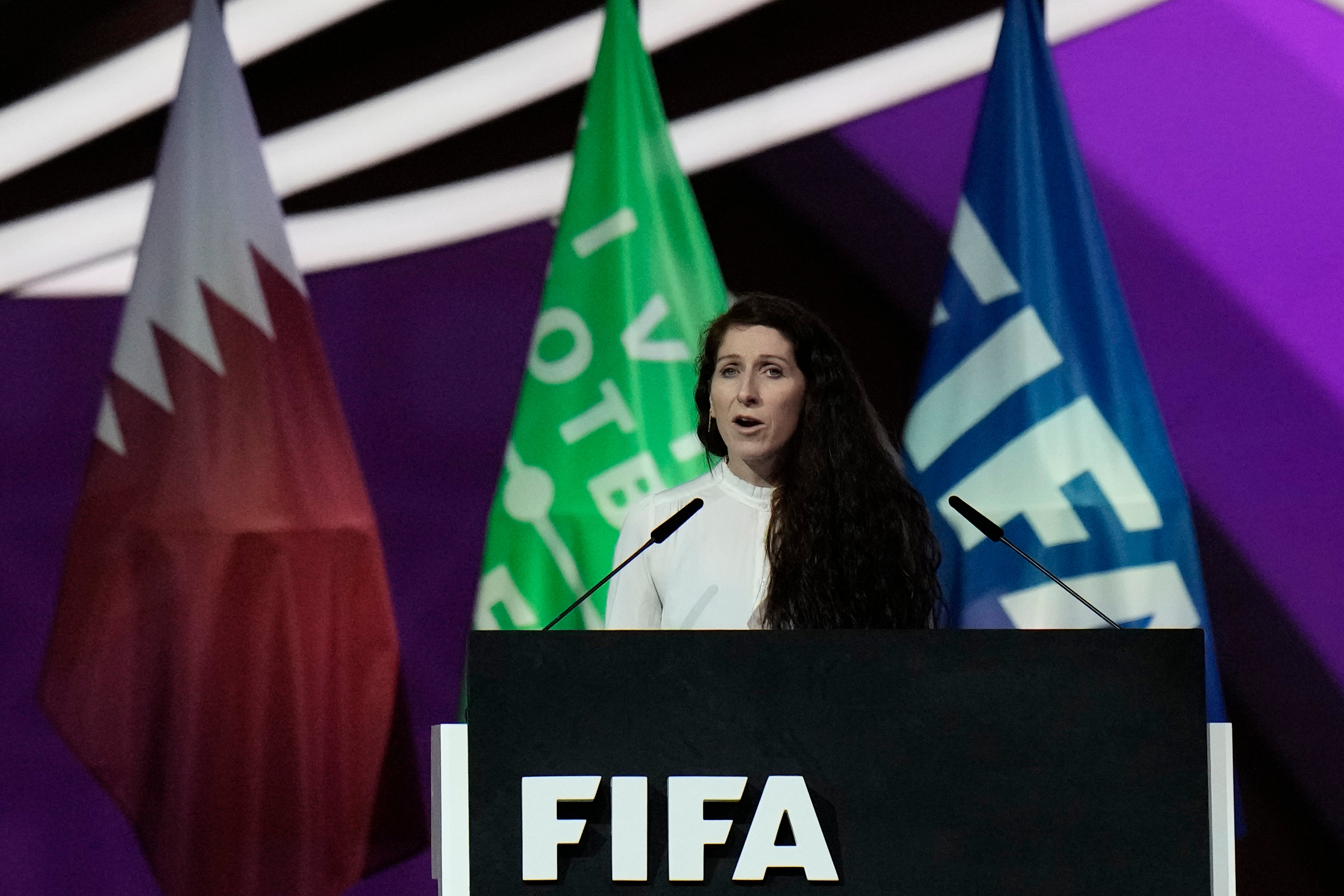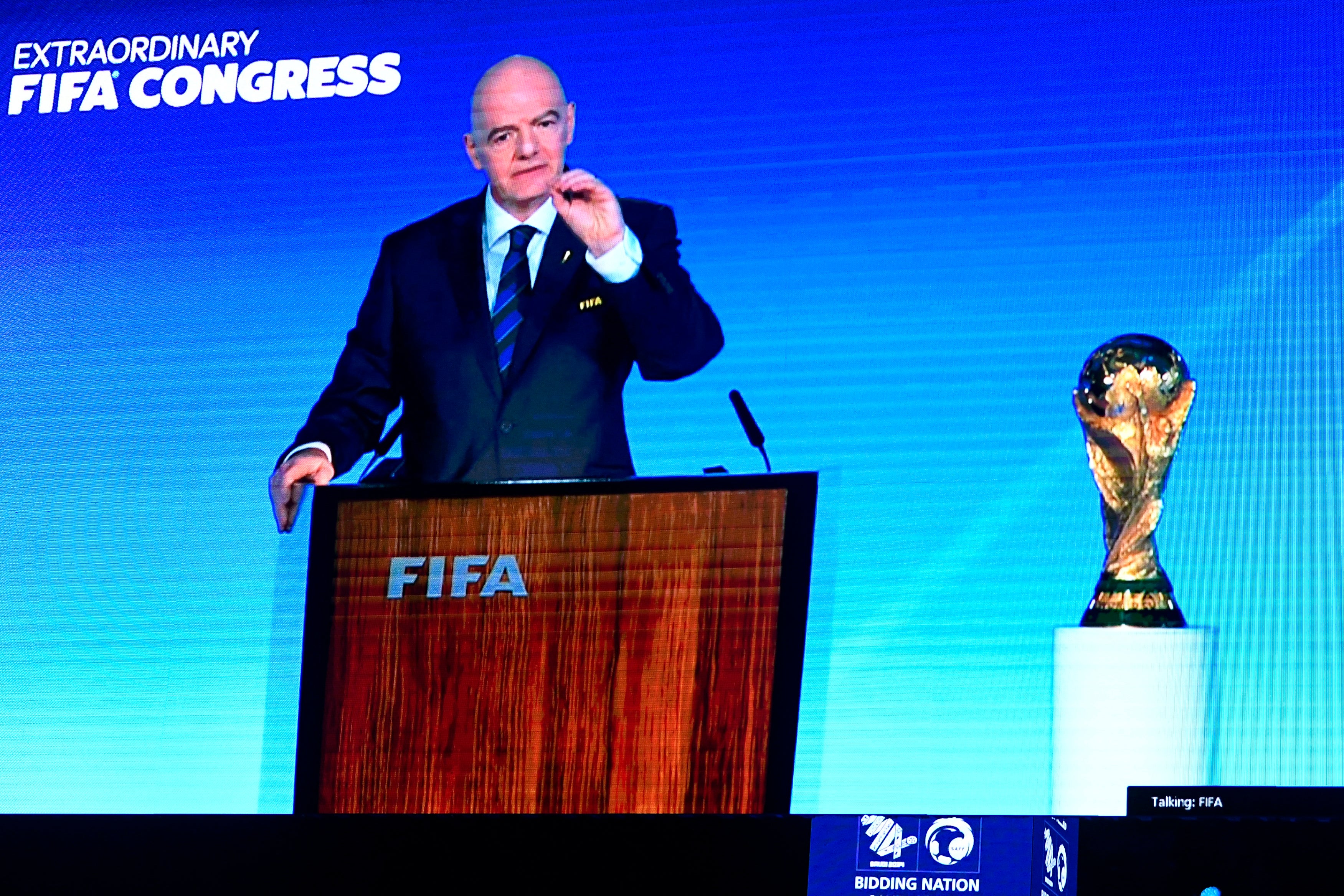By the time that Gianni Infantino was asking members of Fifa’s Congress to raise their hands to their heads so their applause could be seen, there were some who just wanted to cover their faces. They felt this was “embarrassing”. A number of sources maintain they had no choice but to acquiesce, precisely because of the nature of the request: they would be seen.
There was a similar dynamic at the Uefa Congress in February, when Aleksander Ceferin introduced amendments to statutes that could now mean he stays for another term as president. Some member associations wanted to vote against but felt it just wouldn’t be worth the political consequences, since they had to very visibly show their stance in front of everyone.
There is little room for dissent at the top of football’s confederations, much like the autocracies they now court. The presidents, who are really executive presidents, have too much power. So it followed that the bidding processes for the 2030 and 2034 World Cups had single candidates, much like virtually every presidential election since the 2015-16 Fifa overhaul. Morocco-Portugal-Spain and Saudi Arabia were awarded by “acclamation”, in the exact same way that both Infantino and Ceferin were in their last “elections”. An event as elementally uplifting as the World Cup has been put in some grim circumstances over the years, but never quite like this.
Resistance was absent, despite significant reservations. “There is little democracy,” one senior football administrator complained.
That leads to a simple question worth asking. Why does football persist with this unjustifiable executive president structure?
The game is only in this situation because it aligns with the scope of its leaders. In a similar way to how Ceferin now has a strong friendship with Paris Saint-Germain’s Nasser Al Khelaifi, Infantino has a burgeoning relationship with Saudi Arabia. The spheres in which these presidents move is all the more relevant, given that they mean their organisations act as if they are “parallel world governments”, according to Amnesty International’s Steve Cockburn. Or, as one senior football figure put it, “like they’re the Vatican”. Infantino knows Saudi crown prince Mohammed bin Salman through Donald Trump, who he dined with at Davos, of course. Trump then encouraged their friendship, which has blossomed since. There was a meeting of interests.

In Infantino’s election campaign to succeed Sepp Blatter, he made a lot of promises about more money to the member associations, but needed ways to raise it. Bin Salman was Saudi Arabia’s new outward-looking crown prince, with historically unprecedented levels of cash reserves, and he wanted to spend it on football due to its immense political power. Sponsorship and event staging flowed.
This is where the pomp of Infantino’s role is so important, and so intoxicating. Football is so globally popular that everyone wants to court it. Figures like Infantino and Ceferin travel around the world by private jet to be feted like royals, bestowing the unique power of the game. In Infantino’s case, it is the power of the World Cup. In Ceferin’s, it is the Champions League.
They are left free to wield that power with almost no resistance. The confederations, in the words of so many in football, are almost dictatorships. What the president says goes. High-profile sources have maintained that even members of Fifa’s highest body, the Council, did not feel fully informed on issues right up to details of the recent Club World Cup draw and the presence of Ivanka Trump.

The question that isn’t asked enough is why this is actually happening. Why is this power vested in two random men? (And it is always men). Here is the influence of the most popular cultural activity that has ever existed: best give it to “some guy”.
These aren’t even figures like Gordon Brown, who is often mentioned in such capacities, or anyone of significant political weight. They are mere administrators, that happenstance allowed to rise to the top of these unsuitably arcane structures.
So, why does the game just allow this? Where are the attempts at reform?
Some federation presidents like Norway’s Lise Klaveness constantly raise the issue, but it isn’t hard to see why it doesn’t really come from within. It is for the same reasons most acquiesced with the World Cup votes.
In this writer’s book, States of Play, Klaveness described “a very clear culture of keeping your head down”. Many representatives are just “happy to be there”, with no actual principles.
The structure works for them. It is primarily a patronage system, where the money distributed to the federations - mostly through the Fifa Forward Programme and Uefa’s HatTrick programme - ends up repeatedly returning presidents to power.
If you’re a small federation, such revenue can make a huge difference. Getting to stage an event, final or a tournament, then, can make a historic difference. The associations get to look good.
Other officials just enjoy the lifestyle that various committees offer. Insiders talk of how even well-meaning administrators quickly expected not to open their own car doors. Klaveness describes it as “a very big problem” that the system “serves everyone so well with money and travels”.
Why would smaller federations go against Infantino when he brings their federations so much money, especially since some wouldn’t even exist without Fifa’s support? Even for the biggest federations, the leverage of hosting a tournament remains so strong. Bidding cycles can dictate political positions for years. All decisions are “zero sum”. Dissent comes at a significant price, and those who show any are quickly sidelined.
It is why checks and balances are so important, but they have been lacking. This isn't a two-party system where debate is encouraged, after all. By contrast, counterpoints are often seen as disloyalty. Klaveness describes “a cartel”.

The alternative isn’t even difficult to outline: a structure where the powers of the president are split with a chief executive, fortified by robust checks and balances, with strong institutions.
For their part, there are some football officials who are staging an increased number of meetings on this. They nevertheless feel they “don’t have the tools”. That’s why legal academic Stephen Weatherill, of the University of Oxford says “change can’t happen from within” and it needs “external intervention”.
A problem is the very supernational nature of these confederations, especially Fifa, which means they are almost outside anyone’s remit.
There are potential avenues, though. Many European Union politicians are taking an interest, particularly on issues of good governance.
That has partly developed out of a series of legal judgments, from the Super League to the recent Lassana Diarra case, where football’s governance has been repeatedly criticised - particularly for “abusing a dominant position”. There is a strengthening bedrock of legal precedent.

It says much that certain figures in football describe this as “really exciting”. Some officials are being encouraged to read the Federal Act on Cartels and other Restraints of Competition in Switzerland, as it could prove influential in future. Even if any future legislation was restricted to Europe, too, an example repeatedly raised is that of the EU’s General Data Protection Regulation. That serves as a de facto regulator for digital platforms.
Many in the major nations are meanwhile monitoring what happens with the UK’s football governance bill. If the independent regulator is a success, the model may spread, and offer a challenge to the confederations.
These are positive noises, but they have to get a lot louder to drown out that tinny applause.







